Since June I have been convening a working party to discuss assessment. Originally meetings were wide-ranging and took in plenty of discussion and ideas of what did not work. It is a precious balance between focusing a discussion and allowing a free-flowing debate to occur. Certainly our first meeting was characterised by the latter, but at the expense of actually getting anywhere in terms of a tangible outcome to help student learning in the school. However, as we met more regularly our agenda became more focused and something quite spectacular happened; we came up with a detailed and concrete proposal to take to the next level.
Assessment is a huge tranche of teaching, but as we honed into what we did at our school it became apparent that the working party would concentrate our thoughts on what happens after a piece of work has been assessed or marked. It was clear that the standard of marking was very high across departments. However, a common issue was that students did not make enough of the extensive comments, formative assessment and feedback given to them, whether written or verbal. Often it was lost in the maelstrom of comparing performances and grades, or at times completely ignored.
Throughout the process we had three main pillars of thought that we would bear in mind for any proposal:
- It must directly benefit student learning.
- It must avoid a “one size fits all” approach and be flexible enough for different departments to use successfully, but have common elements to tie the system together from one subject to the next.
- It will not increase teacher workload, if it requires more time then time must be found from elsewhere in the school’s assessment programme.
Our proposal is essentially a process of formative evaluation, encouraging the view that learning goes beyond the end of a topic in a scheme of work. In that manner it gives a nod in the direction of mastery learning, with the idea that students are ever building up their skills, knowledge and understanding of a subject. It also looks to focus on what students can do rather than what they cannot; a bank of “I can…” statements are included to highlight the progress made as well as helping to focus the next steps to take. There would be blank spaces for students to add their own “I can…” statements, further tailoring the self-assessment. The process can be summarised in the text and pictures below and would take place on a half-termly basis (NB this example is very much knowledge based as it is coming from a clearly defined Biology topic).
- On completing a piece of work, topic or area students read through a bank of “I can…” statements associated with skills, knowledge or understanding of that work – ideally there would be no mark or grade associated with the work. Students then rank their competence as either 1 – consistently excellent 2 – good or 3 – inconsistent (this did raise the wonderful question of whether we could use emojis for this purpose). The bank of “I can…” statements are presented in the same format from subject to subject but their contents are subject-specific.
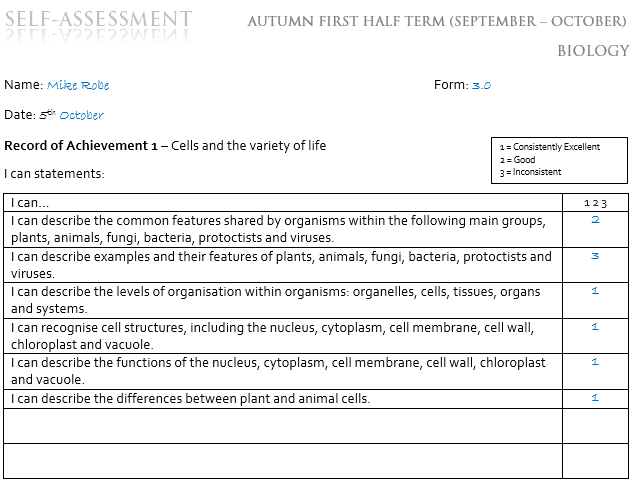
- Students use the information from step one to set a target to work towards, at the same time setting a date to review progress. The teacher comments on the target and signs the sheet.
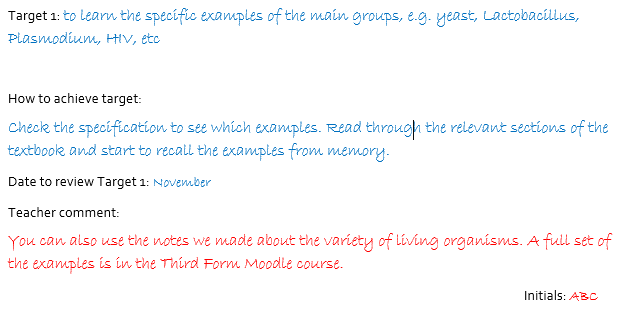
Steps one and two would be presented on the same document.
- In the next half-term students are given a second self-assessment document, deciding how much progress they have made towards their target using a four point scale of None, A little, Nearly there and Got it! Pupils also need to decide the next steps they will take with regards to the target. They also link this work to the School Values, circling those that are appropriate to the work they have completed.
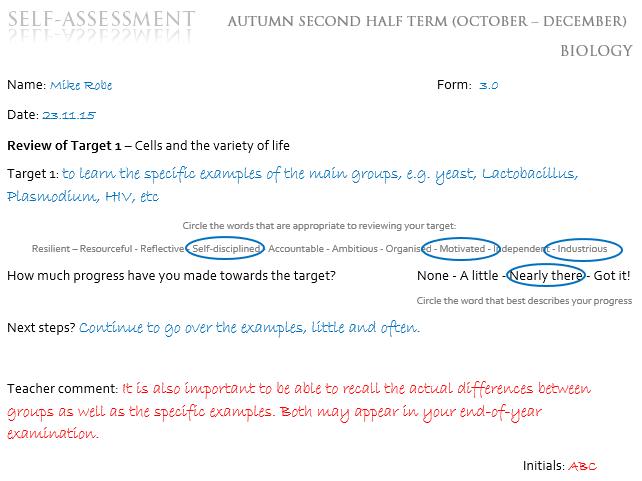
- They then go on to rank themselves with a new set of “I can…” statements (or indeed some of the same from before depending on the subject) relating to the new piece of work or topic.
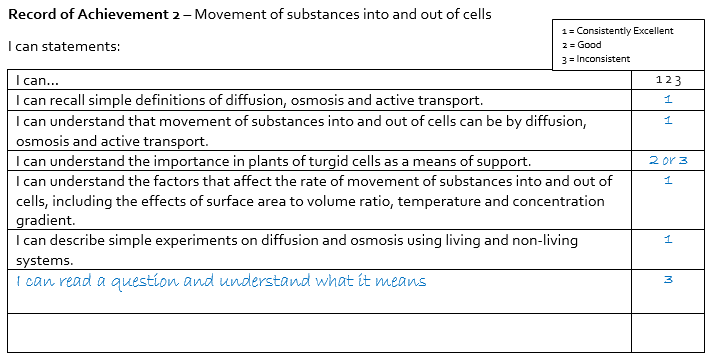
- Students use the information from step four to set a target to work towards, at the same time setting a date to review progress. The teacher takes in the self-assessment document, commenting on progress made towards the original target and also on the new target.
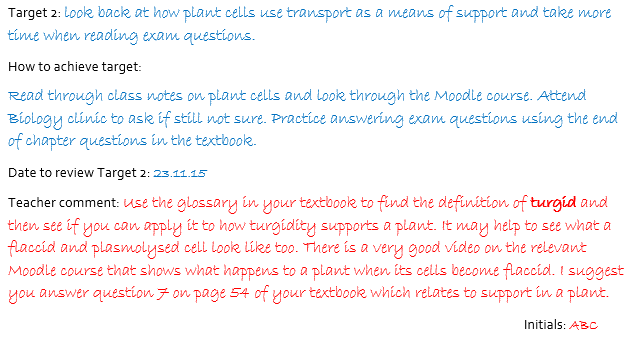
Steps three, four and five would be presented on the same document.
Each department would have free reign to decide the content of the self-assessment document, however, it would need be presented in the same way with the same style and look (see pictures above). This will help to create a common framework that ties the system together so that while the content differs from subject to subject pupils will understand the process and become accustomed to the routine of reflecting on feedback. We proposed that the system be used with our Year 9 classes in September 2016 and that the system would then be reviewed and refined as feedback from teachers using it came back to us (self-assessment of the self-assessment, very meta).
Did we stick to our three pillars of thought?
- It must directly benefit student learning. I hope so! Encouraging reflective practice in students, tasking them to show independent resourcefulness and motivation can only be a good thing. As mentioned earlier this does drill down into the concept of mastery and hopes to give rise to an appreciation that learning is not consigned to individual lessons, pieces of work or topics, but is rather a continuous process that does not sit in defined and discrete blocks of time.
- It must avoid a “one size fits all” approach and be flexible enough for different departments to use successfully, but have common elements to tie the system together from one subject to the next. With HoDs having a free hand to decide what is included within the “I can…” statements it avoids being an unworkable centralised system that will ultimately fail to deliver. By ensuring the documentation looks the same and is formatted identically it gives a common framework to the process.
- It will not increase teacher workload, if it requires more time then time must be found from elsewhere in the school’s assessment programme. Although there is a definite set up cost to deciding the content of the self-assessment document, time has been set aside in a future INSET day for this purpose. Additionally the self-assessment takes the place of a homework on the homework timetable; teachers would collect in and comment on the students’ targets in place of marking their books for that week too.
Some self-criticisms and unanswered questions are listed below. These are issues we are still considering and hope to answer by the time we launch the self-assessments in September 2016.
Q: Where will the self-assessment document reside? Will it be in folder, books or an electronic copy?
Q: How will the self-assessment link to the pastoral system? Can Form Tutors access it to help guide and inform their tutoring of students?
Q: How will it link with reporting? Is this something we would encourage to be shared with parents / guardians?
Q: How do we link it from one year to the next?
What next?
Having shared our findings at a recent Head of Departments meeting we will be given a slot at INSET to present our findings and detail the proposal. Some of the day has also been given over to starting to plan and create self-assessments in departmental meetings. Exemplars will be provided from a range of subjects (Biology, Drama, English, French, Geography and Maths). The aim is then for us to launch in September 2016, informing students of the system through an assembly before they receive their first self-assessment and discussing with parents via written communication and an information evening.














